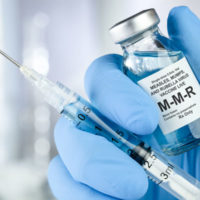Measles: Who Is – And Is Not – Immune?
October 9, 2019 According to the Centers for Disease Control and Prevention (CDC), 2019 is experiencing the highest reported number of measles’ cases since 1992. Since January 1st of this year, there have been 1,241 total individual cases in thirty-one different states.
According to the Centers for Disease Control and Prevention (CDC), 2019 is experiencing the highest reported number of measles’ cases since 1992. Since January 1st of this year, there have been 1,241 total individual cases in thirty-one different states.
Measles is a highly infectious viral disease that can cause serious and sometimes fatal complications. Recent data indicates that certain people (individuals born by or before 1989) who have been vaccinated may not be immune to the virus without getting a second dose. This is critical information, because the majority of cases occur in unvaccinated people.
The measles, mumps, rubella vaccine (also known as the MMR shot) was first introduced in 1971 – and at the time, one dose was considered to be sufficient for protecting people against the viruses. But by 1989, health officials decided to update the guidelines from one shot to two because they noticed that too many vaccinated people were still falling ill.
Despite updating vaccination guidelines, many people in their 30s and 40s – both millennials and gen-xers alike – are unsure whether they ever received their second shot of the MMR vaccine. Though there is a blood test for determining a person’s immunity based on the presence of measles antibodies, researchers say it is flawed. Even people who test negative for antibodies may still be immune to the virus, notes University of California, Berkeley epidemiology professor Art Reingold.
Measles Symptoms and Complications
Measles is so contagious because it is an airborne disease spread through sneezes and coughs of infected persons. When it comes to measles, there are certain symptoms to look out for. Some of the most common ones that people experience include:
- A fever of 104 degrees or higher,
- Inflamed eyes,
- Cough and runny nose, and:
- White spots inside the mouth
The measles virus can cause an array of mild to severe medical complications, such as middle ear infections, diarrhea, and even pneumonia. If you think you or a loved one has the measles, go to the doctor to get tested right away.
When To Get A Second Shot
Most medical professionals recommend that people born in the 70s and 80s get a second MMR shot if they are unsure about their vaccination status – or if they are traveling to an area that is known for measles outbreaks. But, some studies have shown that women and teenage girls who receive a second dose are prone to developing “acute arthritis” anywhere from one to three weeks after getting the vaccine. Most doctors say not to worry too much about acute arthritis, since the symptoms are usually mild and gone quickly.
The best way for someone to know their vaccination status is to confirm it through medical records. Official records are generally accepted as more reliable than a positive or negative antibody test. But, if you are in your 30s or 40s, traveling to a country experiencing a measles outbreak and are unsure about your immunization status, it is recommended to get a second dose.
The U.N. Agency says the 10 countries with the highest number of measles cases are:
- Philippines,
- Brazil,
- Ukraine,
- Yemen,
- Venezuela,
- France,
- Thailand,
- Serbia,
- Sudan, and:
- Madagascar
If you are planning on traveling to one of these countries, it is advisable to make an appointment with a doctor and discuss your MMR immunization options and requirements beforehand.
Philadelphia Injury Lawyers at Galfand Berger, LLP Representing Injured Individuals Since 1947
If you have questions about an illness or injury, please contact our Philadelphia injury lawyers. Galfand Berger has offices located in Philadelphia, Bethlehem, Lancaster, and Reading we serve clients throughout Pennsylvania and New Jersey. To schedule a consultation, call us at 800-222-8792 or complete our online contact form.
 Google Screened
Google Screened
